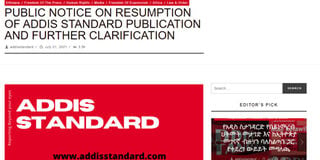Ethiopia reinstates news website after ‘areas of concern’ addressed

Addis Standard, Ethiopian news website whose licence had been withdrawn but later reinstated after authorities said “areas of concern” in their coverage had been addressed.
The Ethiopian government on Wednesday reinstated the licence of private news website Addis Standard, with authorities saying “areas of concern” in their coverage had been addressed.
The development follows pressure from lobbyists who argued that the state was trying to impose its will on independent media on how to cover the conflict in Tigray, where fighting resumed this week.
A statement issued by the media regulator said the two sides had held talks after which the publisher, Jakenn Publishing Plc, reportedly offered to report within the law.
“They have also further assured us that the areas of concern that were observed regarding the usage of certain terms were only an oversight in the course of the editorial process,” the Ethiopia Media Authority (EMA) said.
“Therefore, having come to an understanding regarding past errors and based on their pledge to operate with adherence to the law going forward, we have decided to reinstate their operational licence.”
Not its mandate
The firm, however, suggested in a statement that the Authority had erred in suspending its online publications licence, saying it was not its mandate.
“The mandate to suspend licences of print and broadcast media lies with the EMA board. This will only be activated according to Part V (articles 75-82) of the proclamation. Addis Standard online holds a registration, not a licence, for online media from EMA and as such is not subject to the revocation of licenses under this proclamation,” it said.
“The mandate for impounding or injunction over a content to be transmitted by broadcast and print media lies with a federal or regional public prosecutor if only a clear and imminent danger exists…As such, EMA does not have the mandate to impound media over content it perceives to endanger national security.”
Terminology
The website landed in trouble last week after reportedly continuing with terminology the Ethiopian government was uncomfortable with when reporting on the ongoing Tigray conflict. Authorities in Addis have banned labelling of the Tigray People’s Liberation Front [TPLF] fighters as Tigray Defence Forces, arguing the nomenclature depicted the group as a sovereign army. They also banned labelling of TPLF leaders as the government of Tigray.
Ethiopia has officially proscribed TPLF as a terror group.
After eight months of war, Ethiopia had last month declared unilateral ceasefire, after thousands of its troops were captured by the TPLF. Officially, Ethiopia said it was allowing humanitarian access. It has since all but cancelled the ceasefire and mobilised regional militia to support the fight against TPLF.
On Wednesday, Amhara regional government reshuffled its top military leadership as Tigray conflict spilled further to neighbouring Amhara and Afar region bordering Djibouti.
Accordingly, Amhara region's president, Teshager Agegnew, has appointed Brigadier General Tefera Mamo as the new chief of Amhara Regional State Special Forces.
The reshuffle also saw several other generals and senior military officers assigned by the regional administration to lead various security and intelligence posts.
The reshuffle comes as TPLF rebel forces from Tigray region continue to drive deep into Amhara and further into the Afar region which borders Djibouti.
Military gains
Since last week, TPLF rebels has been claiming major military gains over military operations they carried out in southern and Western Tigray region.
Earlier last week, TPLF forces took control of Korem, Alamata cities and the entire contested Raya zone along the common Tigray-Amhara border.
The Tigrayan rebel forces, deemed by Addis Ababa as terrorists, regained Alamata, the biggest city in the disputed territories of South Tigray, without any stiff resistance and after a large Amhara militia unit withdrew from the city, located south of Korem.
The two cities, Korem and Alamata were under the control of Amhara special and militia forces.
After the two cities’ fall to TPLF forces, Ethiopian Prime Minister Abiy Ahmed, who came under pressure for withdrawing the army from Tigray, then vowed to repel these fresh offensives.
TPLF forces have kept advancing deeper towards the Amhara region to retake disputed towns such as Wolkait Tegede and Setit Humera in a bid to create a buffer zone but also to open up corridors to Sudan to get access to supplies.
The federal government is having difficulties supplying its own forces and has recently been relying on regional forces to battle Tigrayan fighters.
TPLF is currently engaging the Ethiopian army and regional paramilitary units deployed in Amhara region to fight it.






